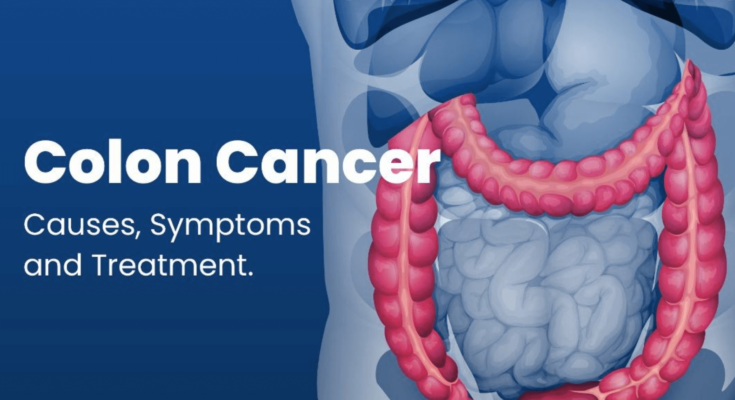Colon Cancer Treatment: Colon cancer, a formidable adversary in the realm of health, demands both early diagnosis and effective treatment strategies.
This comprehensive guide delves into the intricacies of diagnosing colon cancer and the latest advancements in treatment, offering invaluable insights for those impacted by this condition.
What is Colon Cancer?
Colon cancer is a type of cancer that begins in the large intestine (colon), which is the final part of your digestive tract. Typically affecting older adults, colon cancer usually begins as small, benign clumps of cells known as polyps. Over time, some of these polyps can become colon cancers.
Statistics and Prevalence Rates
Colon cancer is a significant health concern worldwide. According to the American Cancer Society, it’s the third most common cancer diagnosed in both men and women in the United States. However, rates of colon cancer in people younger than 50 have been increasing, but doctors are unsure why. Early detection through screening can dramatically reduce the risk of serious complications.
Risk Factors and Causes
Several factors may increase your risk of developing colon cancer:
- Age: While it’s more common after age 50, an increasing number of younger people are being diagnosed.
- Personal history of polyps or colorectal cancer: If you’ve had polyps or cancer before, you’re at higher risk.
- Family history: You’re more likely to develop colon cancer if you have a parent, sibling, or child with the disease.
- Low-fiber, high-fat diet: A diet low in fiber and high in fat and calories may increase the risk.
- A sedentary lifestyle: If you’re inactive, you’re more likely to develop colon cancer.
- Diabetes: People with diabetes or insulin resistance may have an increased risk.
- Obesity: Being obese increases your risk of colon cancer.
- Smoking and alcohol: Both can increase colon cancer risk.
- Race and ethnicity: African Americans have a higher risk of colon cancer.
The Importance of Diagnosis and Treatment
Detecting colon cancer at its earliest stages often leads to a complete cure. With the use of screening tests like colonoscopies, it’s possible to detect and remove polyps before they become cancerous. Treatment typically involves surgery for early stages, while advanced cancer may require chemotherapy, radiation therapy, or targeted drug therapies.
Understanding the importance of early diagnosis and treatment can’t be overstated. Regular screenings can not only save lives by detecting cancer at an early stage but can also prevent the development of cancer by identifying and removing precancerous growths.
Educating the public about the risk factors and the importance of early screening is vital in the fight against colon cancer. If you fall into a high-risk category or are experiencing symptoms, speak with your healthcare provider about the best screening options for you.
Symptoms of Colon Cancer
Let’s provides a detailed list of both early and advanced symptoms of colon cancer and discusses why it’s imperative not to ignore them. Additionally, we strongly encourage seeking medical advice if these symptoms are present.
Early Symptoms of Colon Cancer
- Changes in Bowel Habits: Watch for persistent changes, such as constipation, diarrhea, or a change in the consistency of your stool.
- Rectal Bleeding or Blood in Stool: Any sign of blood, either bright red or dark, in your stool should be a prompt for medical attention.
- Persistent Abdominal Discomfort: This can include cramps, gas, or pain that doesn’t seem to go away.
- A Feeling that Your Bowel Doesn’t Empty Completely: This sensation can be an early sign of colon cancer.
- Weakness or Fatigue: Unexplained weakness or tiredness can also be a symptom.
- Unintended Weight Loss: Losing weight without trying could be a sign of various conditions, including colon cancer.
Advanced Symptoms of Colon Cancer
As the cancer progresses, symptoms can become more pronounced and severe:
- Intensified Abdominal Pain: Increased severity and frequency of abdominal discomfort can occur.
- Severe Constipation or Diarrhea: Extreme changes in bowel habits that persist could be a sign of advanced cancer.
- Blood in Stool Becomes More Noticeable: The amount and frequency of blood in stool may increase.
- Jaundice: Yellowing of the skin and eyes, indicating liver involvement.
- Increased Fatigue and Weakness: These symptoms can become more severe as the cancer advances.
- Significant Weight Loss: Continued unexplained weight loss is a concerning symptom.
The Importance of Not Ignoring These Symptoms
Ignoring the symptoms of colon cancer can have dire consequences. Early detection greatly increases the chance of successful treatment. Symptoms like blood in stool, persistent abdominal pain, and changes in bowel habits are not just minor health issues – they are potential indicators of a serious condition.
Seeking Medical Advice: A Crucial Step
If you or someone you know is experiencing any of these symptoms, it’s crucial to consult a healthcare professional. Early consultation can lead to early diagnosis, increasing the chances of effective treatment. Remember, paying attention to your body’s signals and seeking timely medical advice can save lives.
Diagnosing Colon Cancer
Now, we will explore the list of diagnostic methods, the significance of screening in early detection, and how the diagnosis directly impacts the treatment choices available to patients.
List of Diagnostic Methods
- Colonoscopy: This is the most comprehensive method for diagnosing colon cancer. During a colonoscopy, a long, flexible tube with a camera on the end is inserted into the rectum to examine the entire colon. Any suspicious polyps can be removed and tested for cancer.
- Fecal Immunochemical Test (FIT): A non-invasive test that detects hidden blood in the stool, which can be a sign of colon cancer. This test is typically recommended annually.
- CT Colonography (Virtual Colonoscopy): This method uses CT scans to produce images of the colon. It’s less invasive than a traditional colonoscopy but may not detect smaller polyps.
- Flexible Sigmoidoscopy: Similar to a colonoscopy, but only examines the lower part of the colon. It’s less invasive but may miss cancers in the upper part of the colon.
- Biopsy: If a suspicious area is found, a biopsy is performed to determine if cancer cells are present. This is often done during a colonoscopy.
- Blood Tests: While not a direct method for detecting colon cancer, blood tests can indicate general health and can show anomalies that may suggest further investigation is needed.
The Role of Screening in Early Detection
Early detection of colon cancer through regular screening is crucial. Screening can identify cancer at an early stage when it is most treatable, often before symptoms even appear. Guidelines typically recommend regular screening for individuals over 50 or earlier for those with a family history of the disease or other risk factors. The FIT test and colonoscopies are common screening methods. Early detection significantly improves survival rates, as it often leads to less invasive treatment options and a better prognosis.
How Diagnosis Influences Treatment Options
The method and timing of diagnosis have a direct impact on the treatment options available for colon cancer. Early-stage cancers, often detected through screening, might be treatable with minimally invasive surgery. More advanced cancers may require a combination of surgery, chemotherapy, and radiation therapy. The specific type of treatment also depends on the cancer’s location in the colon, its stage, and the patient’s overall health. A timely and accurate diagnosis allows for a more targeted and effective treatment plan, ultimately improving patient outcomes.
However, understanding the diagnostic methods for colon cancer, the importance of regular screening, and how diagnosis affects treatment options are key components in effectively managing this disease. Early detection through screening not only saves lives but also allows for more effective and less invasive treatment options, emphasizing the importance of awareness and regular health check-ups.
Colon Cancer Treatment Options
Colon cancer treatments vary depending on the stage of the cancer and the overall health of the patient. This guide provides detailed insights into the different methods used to treat colon cancer, helping you make informed decisions about your care.
Treatment Methods for Colon Cancer
Surgery: Surgery is often the first-line treatment for colon cancer, especially in its early stages. The type of surgery depends on the cancer’s location and size. Common procedures include:
- Polypectomy: Removing polyps during a colonoscopy, typically for small cancers.
- Local Excision: For slightly larger polyps or very early-stage cancers.
- Partial Colectomy: Removing part of the colon that contains cancer, along with nearby lymph nodes.
- Total Colectomy: Removing the entire colon, used in certain cases.
Chemotherapy: This treatment uses drugs to destroy cancer cells and is commonly used after surgery to eliminate any remaining cancer cells. It can also be used before surgery to shrink tumors and make them easier to remove.
Radiation Therapy: Often used alongside chemotherapy, radiation therapy uses high-energy rays to target and destroy cancer cells. It’s more commonly used in rectal cancer than in colon cancer.
Targeted Therapy: These drugs target specific abnormalities within cancer cells. Used for advanced colon cancer, targeted therapies can help control tumor growth.
Immunotherapy: This approach helps the immune system recognize and fight cancer cells. It’s typically reserved for advanced colon cancer that hasn’t responded to other treatments.
How Treatments Are Chosen
The choice of treatment depends largely on the stage of the cancer and the patient’s overall health. Here’s how these factors influence treatment decisions:
- Cancer Stage: Early-stage cancers might be treated effectively with surgery alone, while advanced stages may require a combination of treatments like chemotherapy, radiation, or targeted therapy.
- Patient Health: Factors like age, overall health, and existing medical conditions can influence treatment options. For example, a robust patient might handle surgery and chemotherapy better than someone with existing health issues.
Making Your Treatment Decision
It’s important to discuss all treatment options with your healthcare team. They can provide guidance on the best course of action based on your specific situation. Remember, the goal is to choose a treatment that offers the best balance between effectiveness and quality of life.
Understanding colon cancer treatment options is a significant step towards effective care. By considering the stage of your cancer and your overall health, you and your medical team can select the most appropriate treatment plan for you. Always consult with your doctor for personalized advice and stay informed about the latest advancements in colon cancer treatment.
Innovations in Colon Cancer Treatment: Transforming Patient Outcomes
Latest Advancements in Colon Cancer Treatment
In the dynamic field of oncology, colon cancer treatment has seen remarkable advancements. These innovations range from targeted therapies to immunotherapies, offering new hope and options for patients. Targeted therapies, unlike traditional chemotherapy, focus on specific genetic markers present in cancer cells, leading to more effective and less toxic treatment options. Immunotherapies, on the other hand, empower the patient’s own immune system to recognize and combat cancer cells. This approach has shown significant success in treating certain types of colon cancer, especially those with specific genetic profiles.
Clinical Trials and Emerging Research in Colon Cancer
The heart of these advancements lies in ongoing clinical trials and research. Clinical trials are crucial as they test the safety and effectiveness of new treatments. They offer patients access to cutting-edge therapies that are not yet widely available. Current research is delving into areas such as liquid biopsies, which can detect cancer cells in a blood sample, and personalized medicine, where treatment is tailored to the individual’s genetic makeup. These studies are not only groundbreaking in terms of science but also offer a more patient-centric approach to treatment.
Impact of Innovations on Patient Outcomes
The impact of these innovations on patient outcomes cannot be overstated. With more precise treatments, patients are experiencing fewer side effects, a significant factor in improving the quality of life during treatment. The survival rates for colon cancer have also improved, thanks in part to these advanced therapeutic options. Additionally, the focus on personalized medicine means treatments are becoming more effective, as they are designed to target the unique aspects of each patient’s cancer.
However, the landscape of colon cancer treatment is rapidly evolving, with new therapies and research continually emerging. These innovations not only offer hope for more effective treatment but also signify a shift towards more personalized and patient-friendly approaches, ultimately leading to improved patient outcomes.
Living with Colon Cancer: Support and Care
Living with colon cancer presents numerous challenges, both physical and emotional. It’s crucial to recognize the importance of mental and emotional support during this journey. Dealing with the diagnosis and the subsequent treatment can be overwhelming, making support systems invaluable for patients and their families.
Importance of Mental and Emotional Support
When faced with colon cancer, the emotional and mental strain can be as taxing as the physical aspects. It’s essential to acknowledge and address these emotional needs. Mental and emotional support can significantly improve the quality of life for patients, helping them cope with the stress, anxiety, and depression that can accompany a cancer diagnosis. This support can come from various sources, including family, friends, healthcare providers, and mental health professionals.
Resources for Support
- Support Groups: Participating in support groups can be incredibly beneficial. These groups provide a platform to share experiences, offer and receive advice, and gain emotional support from others who understand what you’re going through. Many hospitals and cancer centers offer support groups specifically for colon cancer patients.
- Counseling: Professional counseling or therapy can help manage emotions and stress related to cancer. Psychologists, psychiatrists, or licensed therapists specializing in cancer-related issues can offer guidance and strategies to cope with the challenges of living with colon cancer.
- Online Forums: Online communities and forums offer a convenient way to connect with others. Websites dedicated to cancer support provide platforms where individuals can ask questions, share stories, and find emotional support from the comfort of their home.
Lifestyle Changes and Self-Care During Treatment
Adopting lifestyle changes and focusing on self-care are vital components of living with colon cancer. These include:
- Nutritional Adjustments: A balanced diet, possibly with adjustments recommended by a nutritionist, can help manage symptoms and improve overall health.
- Physical Activity: Engage in moderate exercise as recommended by your healthcare provider. This can enhance mood, boost energy levels, and improve physical strength.
- Stress Management: Techniques like meditation, yoga, or simple breathing exercises can be effective in managing stress.
- Rest and Sleep: Prioritizing rest and ensuring adequate sleep is essential for recovery and maintaining energy levels.
- Avoiding Harmful Habits: Reducing or eliminating tobacco and alcohol use can significantly impact your overall health and well-being.
However, while living with colon cancer is challenging, there are numerous resources available for support and care. Embracing these resources, along with lifestyle changes and self-care practices, can profoundly affect your treatment journey, offering both physical and emotional benefits. Remember, you’re not alone in this fight, and seeking support is a sign of strength, not weakness.
Prevention and Early Detection of Colon Cancer
Preventing colon cancer starts with understanding the risk factors and making lifestyle changes to mitigate them. Here are some actionable tips:
- Healthy Diet: A diet rich in fruits, vegetables, whole grains, and low in red and processed meats can reduce the risk of colon cancer. Fiber-rich foods are particularly beneficial.
- Regular Exercise: Engage in regular physical activity. Aim for at least 30 minutes of moderate exercise most days of the week.
- Maintain Healthy Weight: Obesity increases the risk of colon cancer. Work towards maintaining a healthy weight through diet and exercise.
- Limit Alcohol and Quit Smoking: Excessive alcohol consumption and smoking are linked to an increased risk of colon cancer. Limit alcohol intake and avoid smoking.
- Regular Screenings: Starting at age 45, or earlier if you’re at higher risk, regular screenings like colonoscopies can detect precancerous polyps.
The Role of Genetics and the Importance of Family History
Understanding your family history is vital in the prevention of colon cancer. If you have a family history of colon cancer or polyps, your risk is significantly higher. This includes first-degree relatives (parents, siblings, or children) with colon cancer. Genetic factors play a crucial role, and in some cases, genetic testing may be advised. Discuss your family history with your doctor to determine if you need earlier or more frequent screenings.
The Impact of Early Detection on Treatment Success
Early detection of colon cancer can dramatically improve treatment outcomes. When detected early, colon cancer is often highly treatable, with a wide range of effective treatment options available. Regular screenings like colonoscopies not only detect cancer at an early stage but can also prevent cancer by removing precancerous polyps. Awareness of symptoms, such as changes in bowel habits, rectal bleeding, or abdominal pain, is crucial for early detection. If you experience any of these symptoms, consult a healthcare provider promptly.
However, the prevention and early detection of colon cancer hinge on a combination of a healthy lifestyle, awareness of family history and genetics, and regular screenings. These measures significantly enhance the chances of successful treatment and can save lives.
FAQs Section: Understanding Colon Cancer and Its Treatment
1. What is colon cancer?
Colon cancer is a type of cancer that begins in the large intestine (colon), which is the final part of your digestive tract. It usually starts as small, noncancerous (benign) clumps of cells called polyps that form on the inside of the colon. Over time some of these polyps can become colon cancers.
2. What are the symptoms of colon cancer?
The signs and symptoms of colon cancer include a persistent change in your bowel habits, including diarrhea or constipation, rectal bleeding or blood in your stool, persistent abdominal discomfort, such as cramps, gas, or pain, a feeling that your bowel doesn’t empty completely, weakness or fatigue, and unexplained weight loss.
3. How is colon cancer diagnosed?
Colon cancer is usually diagnosed through several tests. These include colonoscopy, where a long, flexible tube equipped with a video camera is inserted into the rectum to inspect the entire colon, and biopsies, where samples of any suspicious areas are taken for analysis.
4. What are the stages of colon cancer?
Colon cancer stages range from stage I, the least invasive, to stage IV, the most advanced. The stage of cancer depends on how deeply the cancer has penetrated the wall of the colon, if and where it has spread to nearby lymph nodes, and if it’s spread to other parts of the body.
5. What are the treatment options for colon cancer?
Treatment for colon cancer usually involves surgery to remove the cancer. Other treatments may include radiation therapy and chemotherapy, which might be used to destroy any remaining cancer cells, to relieve symptoms of advanced cancer, and to reduce the risk of recurrence.
6. Can diet and lifestyle changes prevent colon cancer?
While not all colon cancers can be prevented, certain lifestyle changes can reduce your risk. These include eating a variety of fruits, vegetables, and whole grains, drinking alcohol in moderation, if at all, quitting smoking, exercising most days of the week, and maintaining a healthy weight.
7. Is colon cancer hereditary?
Some colon cancers are linked to inherited genetic mutations that increase the risk of the disease. However, most colon cancers are not directly inherited but occur due to genetic changes that happen over a person’s lifetime.
8. How often should I get screened for colon cancer?
Screening guidelines for colon cancer typically recommend that people at average risk of colon cancer begin regular screening at age 45. This may be done via colonoscopy, stool tests, and other methods. Your doctor can help determine the best screening schedule for you.
9. What is the survival rate for colon cancer?
The survival rate for colon cancer varies depending on the stage at which it is diagnosed. Early-stage cancer has a higher survival rate than advanced-stage cancer. Regular screening can help detect colon cancer at an early stage.
10. Where can I find support and resources?
There are many resources available for support and information, including cancer support groups, counseling services, and educational materials. Your healthcare provider can offer guidance and direct you to helpful resources.
Conclusion:
Now, let’s reinforce the importance of awareness and early action. Understanding the symptoms, such as changes in bowel habits, blood in stool, and unexplained weight loss, is crucial. However, it’s also important to note that colon cancer can be asymptomatic in its early stages, making regular screenings vital.
This brings us to the most critical call to action: prioritizing your health. Regular health check-ups and screenings are not just a matter of caution; they are a necessity, especially if you have a family history of colon cancer or are above the age of 50. Lifestyle choices, including a healthy diet, regular exercise, and avoiding tobacco and excessive alcohol, also play a significant role in prevention.
In conclusion, awareness, early diagnosis, and proactive health measures are key to combating colon cancer. We encourage our readers to take these messages to heart. Prioritize your health, stay informed, and don’t hesitate to consult healthcare professionals for regular check-ups and screenings. Your proactive steps today can lead to a healthier tomorrow.



